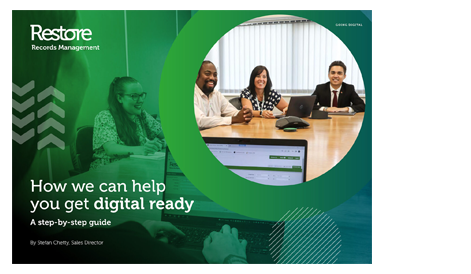
The call to go digital and ditch the paper trail is echoing louder than ever, and it’s easy to see why.
The promise of heightened efficiency, bulletproof compliance, and long-term cost savings is tempting, to say the least. But let’s be honest – it’s not always as easy as it sounds.
For many businesses, diving headfirst into a full-scale digital transformation can feel like swimming against the tide.
Especially when dealing with vast archives of paper records spanning decades, or even centuries.
This is where a hybrid paperlite approach comes in, bridging the gap between the physical and digital realms.
Despite the success stories, digital transformation projects don’t always unfold as smoothly as one might hope. In reality, the statistics present a starkly different narrative. According to a report by Deloitte, a staggering 70% of digital transformation initiatives within organisations end in failure.
Why? Many of these failures come down to financial constraints. Often businesses find that scanning every single document simply isn’t financially viable. Plus, you’ve got hurdles such as a lack of digital skills, technical issues, management meltdowns, and employees giving the side-eye to culture change.
Nigel Dews,
Managing Director, Restore Records Management

Legal requirements for physical documents
Legal requirements are another obstacle on the path to full digitalisation. In certain sectors, laws mandate businesses to generate and maintain physical documents. This means that while businesses can save on physical storage costs by going digital, they may still have to keep the original paper documents for a specified period.
For this reason, the coexistence of physical and digital records has become a practical solution for many.

Counting the costs
Scanning every single record your business holds is expensive and often unnecessary – and it may take a long time to see a return on your investment.
On top of this, if you want to keep paper backups, this adds another layer of complexity and expense.

The solution: paperlite
The good news is that physical records storage has evolved. Technology now allows for on-demand scanning, secure destruction scheduling, and comprehensive document management online. This enables the delivery of a ‘paperlite’ policy rather than rushing straight to ‘paperless’ – and that’s ideal for businesses who are daunted by the journey.
These days physical records are easier than ever to access with every single record tagged – and it’s even possible to manage them through an online portal.
Reducing your inventory and only storing records which need to be kept is a big part of a paperlite future, too. It can save money and make it easier to go fully digital in future because you have fewer records to digitise.

Prioritising high-demand records
Not all records are equally important or accessed with the same frequency. Identifying high-demand documents allows you to prioritise their digitisation, making them readily available online.
This efficient approach saves both time and resources. By evaluating the contents of your archive, you can determine which records should be digitally converted, securely destroyed, or remain in their current physical form.
For frequently accessed records, scanning is the ideal solution. Digital copies can be retrieved instantly, eliminating the need for physical retrieval.

Unlocking space and efficiency
Embracing a hybrid, paperlite, approach facilitates the effortless transition of even the most recently created records, ensuring their accessibility from various storage locations.
As the retention date for specific records approaches, it becomes imperative to ensure their secure disposal, accompanied by the acquisition of a destruction certificate as a testament to compliance.
These measures free up valuable space that can be repurposed to serve other pressing business requirements. In essence, comprehensive knowledge of your records is the key to making well-informed choices regarding what warrants digitisation.
Embracing a hybrid approach isn’t just a compromise; it’s a strategic advantage that blends tradition and innovation. Offering enhanced efficiency, unwavering compliance, and substantial savings – all the benefits of going digital, with much less of the faff!
Further insights



